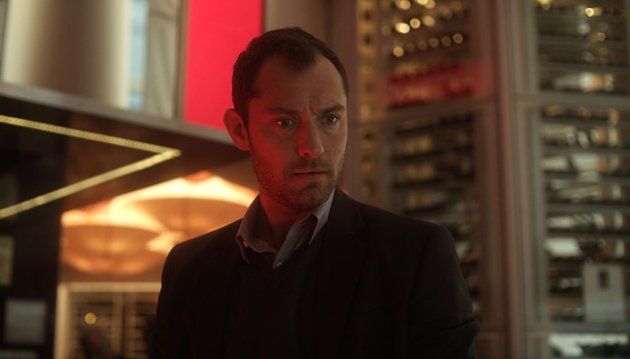Director Steven Soderbergh has said the opening of Side Effects is modeled after that of Rosemary's Baby, with its panning views of a New York City apartment building and the dually pleasing and unsettling tenor of music thrumming beneath.
Side Effects diverts from its cinematic predecessor from here, however, at least where the structural positioning of the inciting action is concerned. After we're swept through the location, we're treated to an internal shot of an apartment, the camera trailing down a dimly lit hallway littered with bloody footprints. It's a slick, spine-tingling way to start your palms sweating, and the build doesn't let up from there.
Soderbergh and writer Scott Z. Burns (who also penned The Informant! and Contagion) reunited to make a film in the style of ‘80s neo-noir thrillers like Body Heat and Fatal Attraction. And in that vein, they've certainly succeeded with Side Effects: It's a fun, tense movie that's rife with red herrings. It's also executed with Soderbergh's precise, thoughtful vision and cool, collected tone. Even when the film breaks out of its straightjacket (and there's one specific twist that's pretty tough to swallow), the sum far exceeds its less forgivable parts. That’s because Soderbergh refuses to drive the narrative train completely off the bridge; he may have been motivated to make a zany popcorn movie, but he's simply too cerebral to let its structural heft submerge fully in schmaltzier waters (even if its script is willing to turn the wheel in that direction). In this sense, Soderbergh and Burns are a great team, providing just the right balance of technical ebb and narrative flow needed to output an emotionally and mentally satisfying product.
We're introduced to Emily Taylor (Rooney Mara), a woman with a history of depression who’s struggling to maintain her emotional well-being as she helps her husband Martin (Channing Tatum) readjust to life following four years behind bars for insider trading. After a few high-risk events, Emily solicits the help of psychiatrist Dr. Jonathan Banks (Jude Law), a man who seemingly has it all together -- gorgeous wife, grandiose apartment, booming practice. But after he prescribes an experimental drug to Emily, things take a shocking turn, and the ripple effect upends all their lives.
The movie embeds us in scenes of upscale-restaurant deals between drug company reps and practitioners, flashbacks to fancy parties with cronies in the finance industry, best-practice meetings with government officials, moments of chaos and emotional terror on the part of those suffering from depression, therapy sessions filled with ultimatums and tricks, and bleak scenes inside the walls of mental institutions - all of them blurring the lines between exploiter and exploited, knotting a mass of crisscrossing reality, morality and accountability. This isn’t a procedural about Big Pharma or insider trading, though: All of these themes, timely and worthy of exploration as they may be, are simply an encasement within which the film's action lies.
Mara and Law are phenomenal in this. Law really is one of the finest actors in the business, and you'll be properly terrified of him after this film; he's a powder keg, and he's not too proud to go to some truly ugly places. Mara's performance is the most challenging -- both layered and detached, haunted and frustrated. She's a prisoner in her own body to the point of discomfort for the viewer.
Technically, the movie is as you'd expect from Soderbergh, filled with well-timed transactions, sparse lighting, thoughtful camera movements and interesting focus play. His collaboration with composer Thomas Newman is also fantastic. The influences lie in Krzysztof Komeda's Rosemary's Baby score, but Newman breathes modern life with his signature strings, chimes and baselines. Everything about the look and sound of this film is meant as a play on unsettling and settling, and that movement between the two creates an almost seasick feeling for the viewer, a perfect metaphor considering the subject matter.
Soderbergh said Side Effects is his last feature film, and whether those retirement plans actually stick, it's certainly a stylish, thrilling, memorable way for him to go out. The movie is shocking on first experience, but subsequent viewings prove it to be even richer and more interesting. It’s a satisfying thriller that doesn't cut corners, and that unnerving feeling you experience will prove that much once the credits roll.
Side Effects opens today.
Related: Soderbergh and Side Effects Cast Delve Into Director's Final Film
Side Effects Writer Scott Z. Burns on Soderbergh, Tension & Apes

